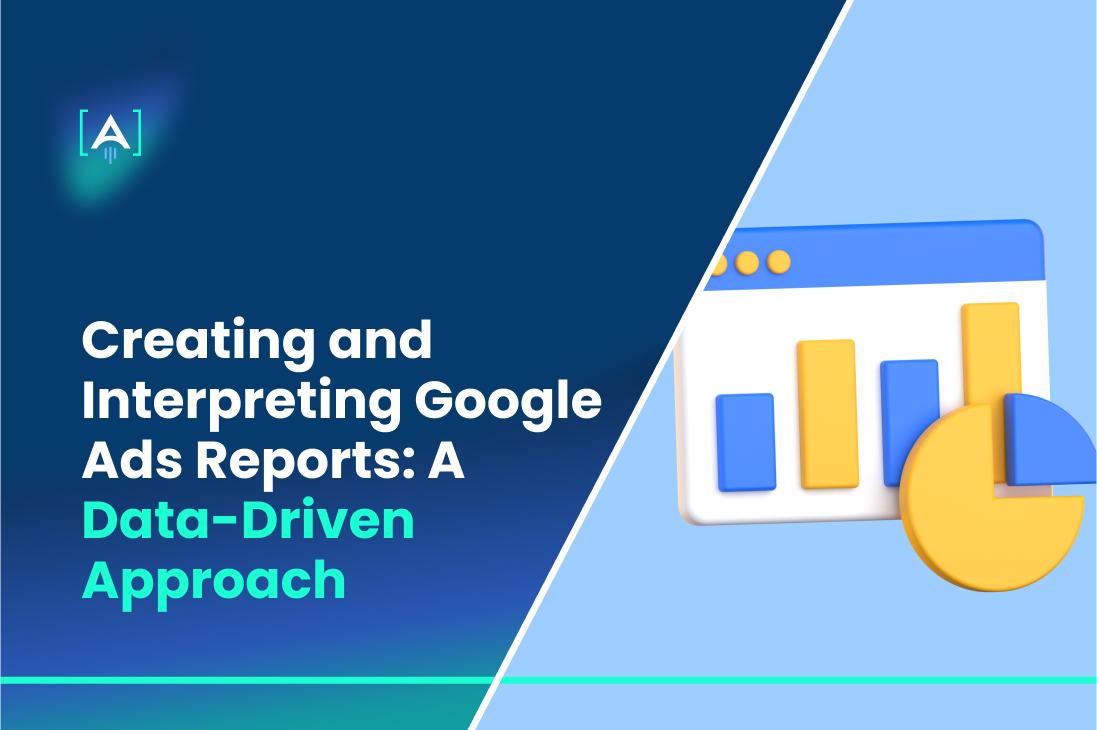If you want to get the most out of your online advertising, understanding Google Ads reporting is not just critical but empowering.
Businesses generate $2 in revenue for every $1 on average spent on Google Ads? This shows just how powerful a well-managed Google Ads campaign can be.
It puts you in control, giving you the confidence to make informed decisions and drive your business forward.
Google Ads reporting is a tool that helps your ads track their performance; it also enables you to get insights that would be helpful for your marketing strategies.
From clicks and impressions to conversion rates and return on ad spend (ROAS), these reports will give you a complete idea of what’s happening and what areas you need to work on.
Partnering with a professional Google ads agency will definitely be beneficial for your business.
At Azarian Growth Agency, we don’t just provide comprehensive Google Ads reporting solutions; we provide support and guidance every step of the way.
Whether aiming to boost your online presence, attract more qualified traffic, or maximize your ROI, our team is here to guide you through the complexities of Google Ads, ensuring you’re never alone in your online advertising journey.
In this article, we’ll drill down to the basics of Google ads reporting.
We will review a tutorial on setting up effective reports and understand important metrics and tools for market analysis.
The Importance of Google Ads Reports
With Google Ads reporting being at the forefront of digital marketing, it is how advertising strategies are optimized.
It is a tool that extends the frontiers of your business by providing insights into how your ads perform, allowing you to choose the best-performing ones to maximize your ROI.
Whether advertising via the Google Ads interface or the Google Ads API for more advanced management, knowing the metrics and data available is essential for achieving good results.
One of the leading pros of Google Ads reporting is that it helps companies plan better and act more strategically. With it, you can monitor and analyze many metrics like unique visits and conversion rates, providing you with the whole picture of your ad’s efficacy.
For instance, you can utilize the report tool to complete a Google Ads competitor analysis, whereby you can tell what strategies are attracting the most potential clients in your industry and then modify your model to suit these new.
This strategic use of data can give you a competitive edge in digital marketing.
Besides, Google Ads reports are necessary to control and make your Google Ads account profitable. They allow you to keep track of critical metrics such as CTR and CPC so you can know what to allocate the extra funds for and adjust your bids.
The in-depth stats provided by the Google Ads reporting tool can be a significant lever in optimizing your targeting efforts, and you will know that your ad placements are timely and to the point.
These reports are non-negotiable for analyzing product advertisements for online stores doing business in a Google Merchant Center environment.
It is understood that finding and reviewing data from Google Ads campaigns is instrumental in streamlining product listings and generating increased Google search visibility.
This is significant, especially for e-commerce companies, in their quest to exploit the load strength of online presence and sales.
One of the pillars of improving the result of your advertising programs, not only by finding out its limitations but also by analyzing the growth process of successful advertising, is proper data analytics.
This is how to know the correct way to achieve a goal and bring your marketing to the edge.
Setting Up Effective Google Ads Reports
Creating effective Google Ads reports helps track the success of your PPC campaigns and optimize your ad spend.
Here’s a guide to setting up reports that provide actionable insights:
- Defining Objectives and Metrics: Start by defining the key objectives of your campaigns. Are you focusing on increasing sales, generating leads, or boosting brand awareness? Once your goals are clear, determine the metrics that will help measure success.
These metrics could include CTR, conversion rate, cost-per-click, and overall ROI. Utilizing the Google Ads reporting tool, you can create customized reports focusing on these metrics, providing a clear picture of your campaign’s performance. - Utilizing Predefined Reports and Custom Reports: Google Ads offers several predefined reports that can be a great starting point for analyzing campaign performance.
These reports provide insights into ad performance, ad groups, and keyword effectiveness. Additionally, custom reports allow you to tailor the data to specific needs, such as tracking negative keywords or analyzing the performance of specific landing pages. - Incorporating Negative Keywords: One of the key strategies in setting up effective Google Ads reports is to track the performance of negative keywords. By excluding irrelevant searches, you can ensure that your ads appear only in relevant Google search results, optimizing your ad spend.
This also helps improve your ad positions on Google SERPs, ensuring your ads reach the right audience. - Segmenting Data by Ad Groups and Campaigns: Segmenting your data by ad groups and campaigns can provide deeper insights into performance.
This segmentation lets you see which ad groups perform well and which need adjustments. It can also help analyze ads’ performance across target keywords and demographic segments. - Leveraging the Keyword Planner: Utilize tools like Google’s Keyword Planner to identify high-performing keywords and optimize your bids. This tool can also help identify new opportunities and gaps in your keyword strategy, enabling you to refine your target keywords for better performance.
- Analyzing Google Merchant Center Data: For e-commerce businesses, integrating data from Google Merchant Center can provide valuable insights into product performance.
Tracking metrics such as impressions, clicks, and conversions for product ads can help optimize listings and improve visibility in Google search results. - Setting Up Automated and Client Reports: Automating your reporting process can save time and ensure consistency. Use Google Ads’ automated reporting features to schedule regular updates.
Additionally, setting up client reports with explicit, visual data representations can help communicate performance metrics effectively to stakeholders.
By setting up effective Google Ads reports, you can comprehensively view your PPC campaigns, make data-driven decisions, and improve your advertising strategy for better results.
Whether you’re tracking ad groups, negative keywords, or product performance from the Google Merchant Center, these reports are essential tools for maximizing your ad spend and achieving your marketing goals.
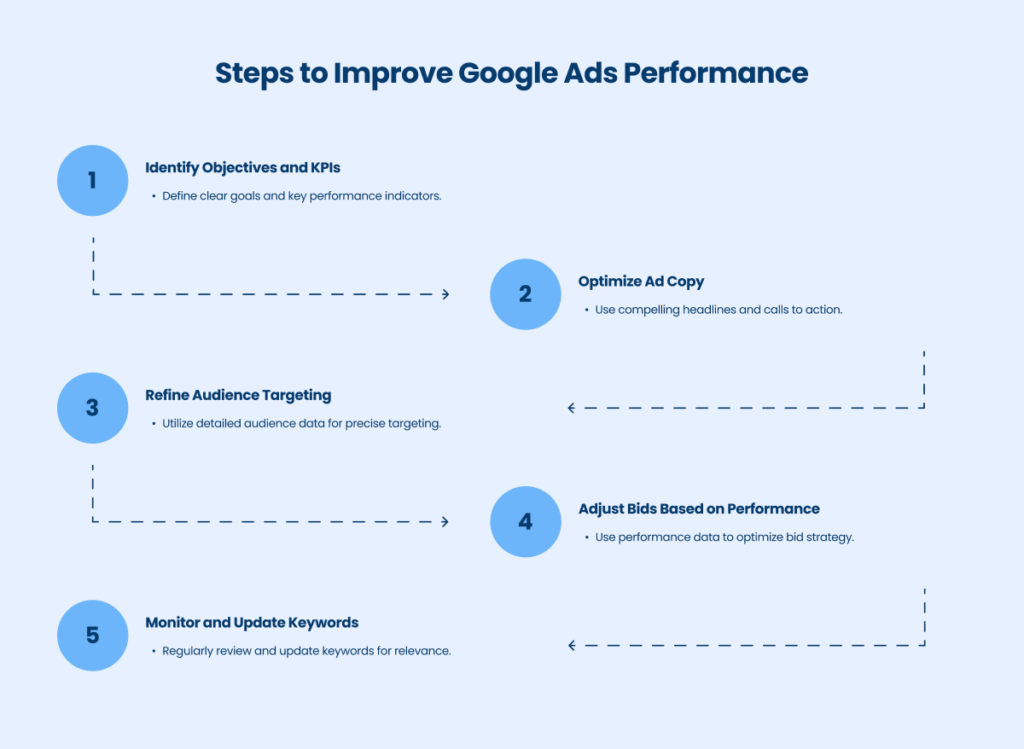
Interpreting Google Ads Reports
The importance of reporting in Google Ads lies in refining a digital marketing strategy and maximizing ROI. Creating a high-converting Google Ads landing page is essential for maximizing the effectiveness of your ad campaigns and ensuring a strong return on investment.
According to Statista, in 2020, Google’s ad revenue exceeded $147 billion, a dimension that prefigured the possible impact of Google Ads. With this information, businesses can work out an optimal Google Ads strategy for the best results.
Check Our Ultimate Google Ads Glossary
Source: Statista
Performance Data Analysis
Examine the core performance data for impressions, clicks, and conversions. These metrics provide a snapshot of ad performance.
The average click-through rate for search ads across all industries is about 3.17%, hence, these metrics must be closely watched.
How to Understand Google Ads Audience Targeting
Among the many other outstanding benefits of reporting in Google Ads is the ability to provide all essential details regarding audiences, including their demographics, interests, and geographical locations.
You can slice this information to learn how to edit the audience targeting in Google Ads, given the aims of your campaigns, and in a way that will reach the most relevant audience.
It helps analyze specific keywords and search terms at a granular level with the Google Ads reporting tool.
The analysis assists in identifying which of the keywords drive the most traffic and conversions. Help one in competitive research and analysis by showing which keywords your competitor is bidding for.
Understanding Auction Insights
The Auction Insights report details how your ads are faring compared to other advertisers when bidding for the same keyword.
With this feature, you can better understand where you are in terms of competitive placement and ensure that you apply better bids toward more ad placements and better visibility.
Understanding Formerly AdWords Metrics
From the platform provided by Google, formerly called AdWords, replete with all the data points like CTR, CPC, and conversion rates, learning what each of those metrics means and how to use them rightly forms an integral part of driving cost-effectiveness and ROI for your campaigns.
For example, the average CPCs on Google Ads vary tremendously from one industry to another; therefore, at the very least, analysis needs to be done at the industry level for them.
Adjust Bids with Performance Data
You can use performance data to adjust your bids for specific keywords and placements. This proactive approach ensures that you spend your ad budget on your most profitable opportunities effectively.
Regularly reviewing and adjusting the bids is a key strategy for being competitive and efficient in the distribution of your budgets.
Negative Keywords
Add negative keywords to the campaigns to filter out irrelevant searches. This ensures that the ad reaches the most relevant audience, thus optimizing ad spend.
With the right analysis of Google Ads reporting, businesses can make data-backed decisions that empower them to steer their campaigns toward success.
From Google Ads audience management to auction insights to deep competitor analysis—quality insights will drive these callouts significantly in building a strong and effective Google Ads strategy.
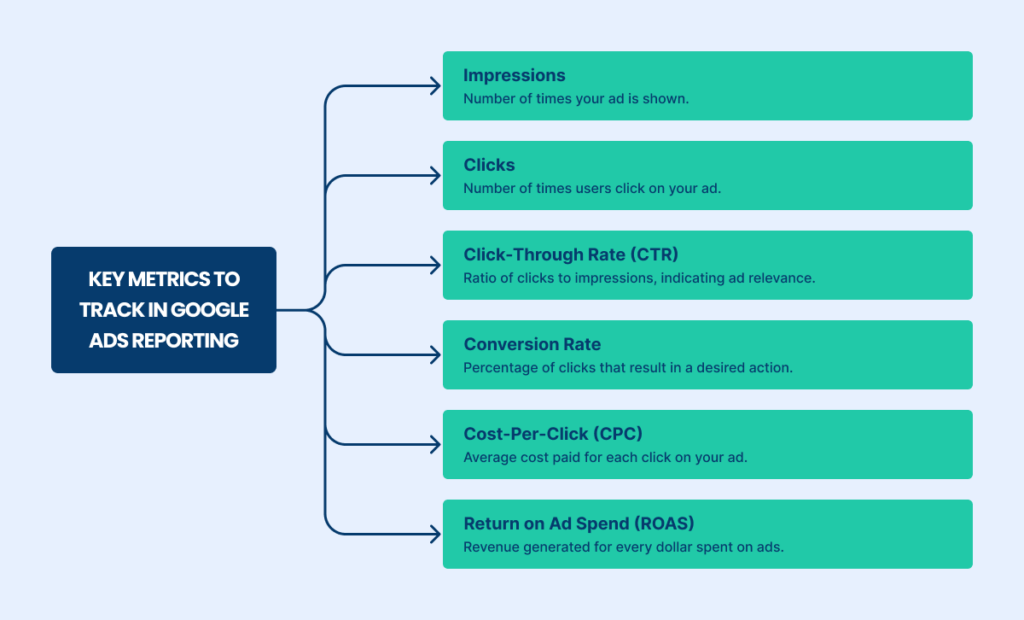
Advanced Reporting Techniques
You cannot just stop at the reporting provided by Google Ads but have to move on to advanced techniques for optimizing your digital marketing efforts. Here, you get a granular view regarding the performance of your campaign, further aiding in strategic planning. Some key strategies are:
Segmentation and Custom Dimensions:
- Segmented Data: You’ll be able to segment data about various types of devices, geographic locations, ad group performance, or anything else and then look at trends within those segments. For instance, if your bounce rate is higher on mobile, you might need some landing page optimization work or more mobile-friendly ad creatives.
- Custom Dimensions: You can track key metrics that are particular and unique to your business, such as different types of customer interactions or categories of products. It helps you tailor marketing strategies more precisely to different audience segments.
Tracking Your Competitors’ Google Ads Campaigns:
- Auction Insights: The Auction Insights report contains some essential information about how well your ads perform and the performance of other advertisers after the exact keywords.
This includes impression share, overlap rate, and position above rate, among others. This information helps learn about the competitive landscape and refine one’s bidding strategies for increased ad visibility and effectiveness.
- Competitive Analysis: While Auction Insights gives insight into the competitive landscape, a complete competitive analysis may be conducted to determine what other keywords they are targeting, their ad copy strategy, and campaign performance.
This can help formulate your keyword strategy and write compelling ad copy.
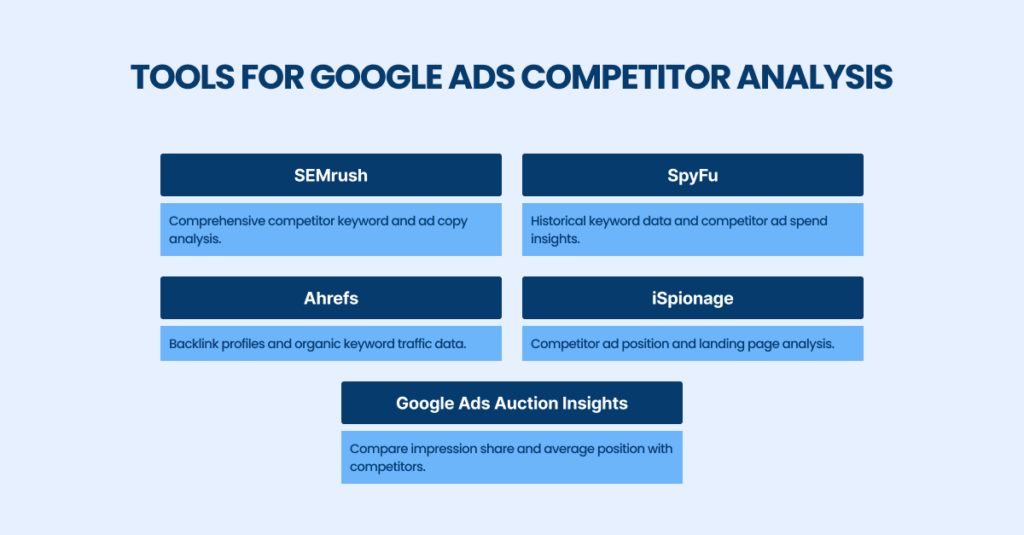
Combine Google Analytics with Other Tools.
- Improved user behavior tracking: Integrate Google Ads Reports with Google Analytics to track users’ behavior in detail, including time on site, bounce rate, and conversion paths.
For example, traffic bounces off your site almost immediately after clicking through. If so, this could be a mismatch between ad content and the landing page, requiring changes to your ad or landing page design.
- Integration with Google Merchant Center: Integrate data from the Google Merchant Center into your Google Ads reporting tool to gain insight into the performance of your product listings.
This will enable a company to track impressions, clicks, and conversions involved in optimizing product data for better visibility in Google search.
Set Up Custom Alerts and Automated Reports:
- Custom Alerts: Google Ads will inform you about the most prominent changes in metrics related to your campaigns. This lets you be more responsive to possible concerns or opportunities.
- Automated Reports: Computerize the reporting features available on Google Ads to schedule updates on campaign performance from time to time. This will ensure timely access to critical data, allowing one to make informed decisions without constant manual monitoring.
Use of Google Ads API for Deeper Analysis:
- Advanced Data Access: Google Ads API enables businesses to analyze their data. It will let you automate the generation of highly complex reports, swamped with minute details like keyword performance, ad spend distribution, and the impact of various ad extensions. That level of detail is beneficial for large campaigns or accounts requiring close management.
Tracking KPIs:
- Identify critical KPIs: Focus on key metrics relevant to your business that will support your goals, such as conversion rate, cost per conversion, or ROAS. Monitoring KPIs will help ensure that these campaigns are not only gathering clicks but truly driving business outcomes.
- KPI Dashboards: Set up dashboards that provide a real-time review of these KPIs. It will give you an instant overview of your campaign’s health and spot trends or issues of concern.
A/B Testing and Multivariate Testing:
- A/B Testing: Conduct A/B testing on different ad elements and corresponding landing pages to identify what works and doesn’t. This can include testing variations in headlines, images, calls to action, and many more. A/B testing ensures that your ads obtain maximum engagement and conversion rates.
- Multivariate testing—in its simplest definition—permits several elements to be tested simultaneously in more complex scenarios. With this approach, you will learn how different combinations of these elements interact with user behavior to optimize ads for conversions.
By applying these new reporting methods in Google Ads, you will be able to obtain profound insights into your campaigns, target more precisely, and optimize ad spend.
Be it detailed competitive analysis, refinement of Google Ads landers, or simply setting up automated reports, these strategies enable the information needed to stay ahead in the competitive digital landscape.
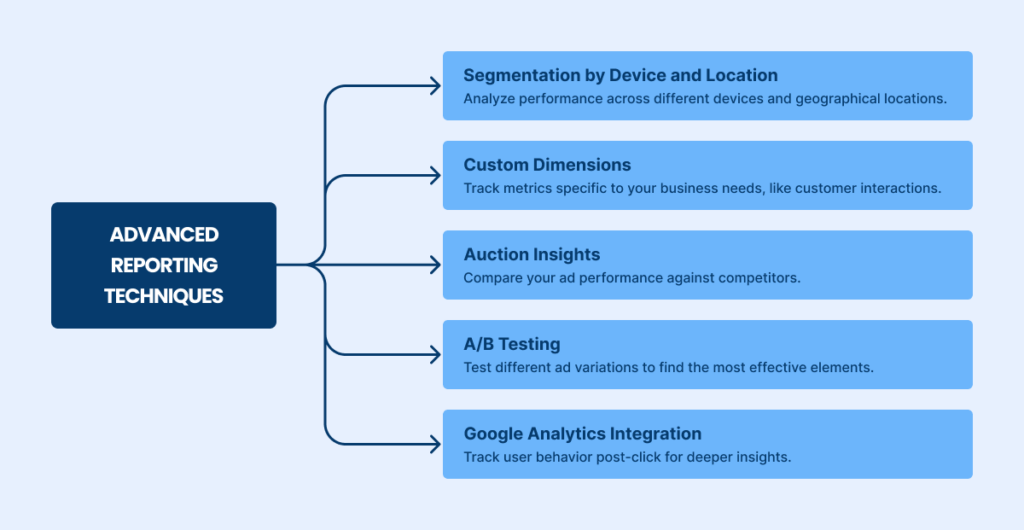
Take Your Campaigns to the Next Level with [A] Growth Agency
In conclusion, mastering Google Ads reporting is pivotal for any business aiming to optimize its digital marketing efforts.
From understanding the basics of performance metrics to leveraging advanced tools and strategies, a well-rounded approach to Google Ads reporting ensures that your campaigns are practical and efficient.
The insights gained from detailed reporting can inform better decision-making, from refining audience targeting to adjusting bids and optimizing ad copy.
Businesses can significantly enhance their advertising outcomes by continuously monitoring key metrics and implementing advanced techniques such as segmentation, competitive analysis, and A/B testing.
At Azarian Growth Agency, we specialize in providing comprehensive and tailored solutions for all your Google Ads reporting needs.
Our expertise as a Google Ads agency enables us to transform complex data into actionable strategies, ensuring your campaigns reach their full potential.
It is a professional team that knows more about the tool Google Ads reporting, enabling us to navigate complexities in digital marketing by giving them actionable insights and strategies that drive growth.Be it the optimization of already existing campaigns or the launching of new ones, the partnership with Azarian Growth Agency is a real deal in keeping any business a step ahead of the competition.
Get Your Free Marketing Plan now, and let us help you turn data into decisions and advance your advertising strategies!
